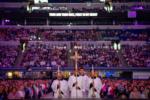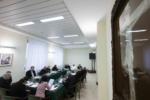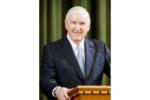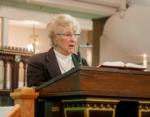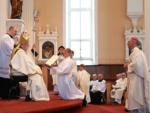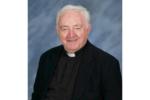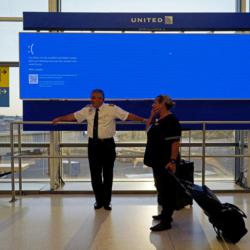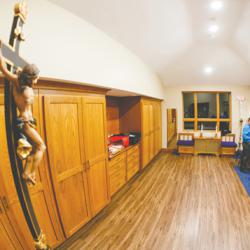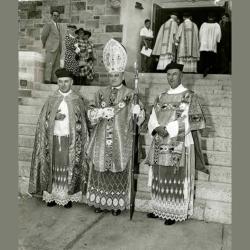Annual prayer breakfast honors legacy of Martin Luther King
ROXBURY -- "Just as the prophets of the eighth century B.C. left their villages and carried their 'thus saith the Lord' far beyond the boundaries of their hometowns, and just as the Apostle Paul left his village of Tarsus and carried the Gospel of Jesus Christ to the far corners of the Greco-Roman world, so am I compelled to carry the gospel of freedom beyond my own hometown. Like Paul, I must constantly respond to the Macedonian call for aid."
Martin Luther King, Jr. wrote those words in his 1963 "Letter from Birmingham Jail." On Jan. 15, which was both Martin Luther King Jr. Day and the 95th anniversary of King's birth, Dr. Joe-Ann Fergus read them during the 38th annual Rev. Dr. Martin Luther King Jr. Prayer Breakfast at St. Katharine Drexel Parish in Roxbury. Fergus is the director of the Massachusetts Nurses Association's Division of Member Services and a member of the Regis College Board of Trustees.
The message of this year's breakfast could best be summed up by King's famous quote: "Injustice anywhere is a threat to justice everywhere."
"Martin Luther King was so adamant about love," said keynote speaker Rev. Laura Reyes, pastor of the United Baptist Church in Jamaica Plain. "He was so adamant about injustice. And here, every day, we walk by, we hear it, and we act like it doesn't concern us. What is going on with us as a people? Not just Black, but all people."
Rev. Ada Renee Williams of Bethel AME Church in Baltimore was originally scheduled to serve as the day's keynote speaker, but she was unable to attend due to illness.
In her address, Reyes admonished a society that had grown desensitized to poverty and violence, particularly gun violence between young Black men in Boston's low-income neighborhoods.
"We're not in chains," she said, "but we are in captivity, because we sit behind our tent doors, we sit behind our churches, we sit behind our parish, we sit behind our mosque, and we live in fear. And that's captivity. But one thing we've got to remember is that Dr. Martin Luther King did not live in fear."
In 2023, Reyes was inducted into the Martin Luther King Jr. College of Ministers and Laity's Board of Preachers at Morehouse College, King's alma mater. She said that "the voice of Martin Luther King is gone" and it will not come back until Judgment Day.
"But until then," she said, "you and I have the responsibility to be that voice."
Reyes, a Boston native, was seven years old when King was assassinated on April 4, 1968. She and her cousin were watching "Bewitched" when Walter Cronkite came on TV to announce the news.
"Being little girls, we don't care about Walter Cronkite and what he has to say," she recalled. "Not realizing that we were living history."
Everyone else in her home was screaming and crying. The night after King's assassination, as riots were taking place in cities throughout the U.S., singer James Brown performed to 2,000 people at the Boston Garden arena. During such a tumultuous time, Reyes said that Brown was "a voice of reason."
"When he started singing and speaking to the people, it soothed their souls," she said. "So, we today, ladies and gentlemen and brothers and sisters, we have to use our voice to soothe the soul. We have to use our voices in such a way that it penetrates, because we're living in a society where people don't care about people anymore."
She told breakfast attendees to not be afraid to speak out against injustice, and communicate those values to young people and their families. She said that anyone who would attend the Jan. 15 breakfast, but not speak and act against injustice like King would have, shouldn't come to any more breakfasts in King's honor.
"It's nice to have breakfast," she said, "but what are you going to do after breakfast?"
Most importantly, she said, the world must remember that King was a pastor and "a man of God."
"Martin Luther King was not perfect," she said, "but he stood for righteousness. He had flaws, but he stood for what is right. He had inconsistencies. That's what we are as human beings. We got all kinds of stuff going on, but we stand together and we heed to the call that God has placed."
Cardinal Seán P. O'Malley, who attended the breakfast with Bishop-elect Cristiano Barbosa, thanked Reyes for "eloquent words that touched our hearts."
In his remarks, he lamented that many holidays on the calendar have lost their meaning.
"This is one of the most important holidays because the legacy of Martin Luther King is so important for our country and our world," he said.
He said that any flaws King had were "eclipsed" by his sacrifice.
"He laid down his life for love," Cardinal O'Malley said. "And that's what it's about. He was an extremist for love."
The cardinal recalled his childhood growing up in a time of segregation and "terrible racial prejudices.'' He recalled people saying there would never be a Black president.
"We have to be the voice, as Rev. Reyes was saying," he said. "Without Martin Luther King in our world, that voice is still so necessary, that witness, that martyrdom. That's what has changed the course of history."
The breakfast ended with the Archdiocese of Boston Black Catholic Choir, which performed throughout the morning, singing "We Shall Overcome."


